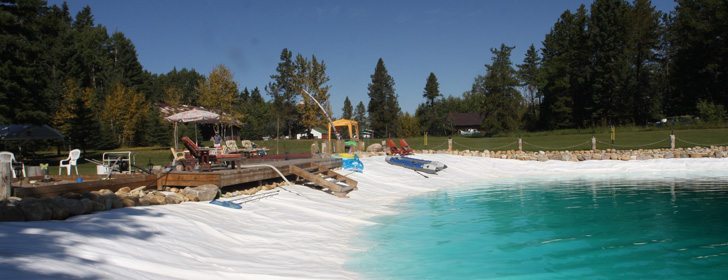SUNDRE, Alta. —When Jerry Leussink built a dugout for swimming on his Alberta farm, he went a little crazy.
His dugout is larger than most small town swimming pools and fancier than some Caribbean resorts.
“You’ll never see another farm dugout like this.”
With a white liner, deck chairs, nautical ropes and an endless supply of floaty things, Leussink’s dugout is a far cry from most dugouts where country kids swam on hot summer days.
“I had a pond, but I wanted to go 10 steps further.”
Read Also

Agriculture ministers commit to enhancing competitiveness
Canadian ag ministers said they want to ensure farmers, ranchers and processors are competitive through ongoing regulatory reform and business risk management programs that work.
Seven years ago Leussink rented his brother’s track hoe to dig the 110 foot by 90 foot dugout near his Sundre home snugged up to the Rocky Mountains in western Alberta. After three years, he pumped out the water and with a crew of 10, lined the dugout with a heavy, white plastic liner to keep down the weeds and mud and make the dugout a focal point on the farm.
“When you tell someone you have a pond they think of something with weeds in it. They haven’t seen anything like this on a farm.
“If it wasn’t for the spruce trees you’d think you were in the Caribbean.”
Four boulders on each corner anchor the plastic liner securely in place. Along the sides, Leussink and his wife, Marina, hand placed thousands of washed rocks to secure the liner and prevent debris from seeping from the grass into the water.
Each year Leussink adds a few more touches. On the west side is a wooden deck for dancing and sand box for the kids. The former owner of the farm was a collector and Leussink recycled a collection of posts and rope to give it a more nautical theme.
“Every year I get an idea and add a little bit more.”
He is tossing around the idea of making a wood-heated hot tub and possibly a change room that could double as a sauna in the winter when the dugout is used for skating parties.
The farm has become the permanent home for family reunions and parties. For Marina’s 50th birthday, she requested inflatable toys for the pool for everyone to float on during family pool parties.
“It’s a virtual zoo.”
A small battery-powered seadoo is tossed into the mix of water toys and slowly putts around the pool pulling a boat full of children.
“They have so much fun. No one wants to miss a reunion.”
Having the fanciest dugout in the area isn’t without its share of work. Leussink estimates it takes 15 to 20 hours a month to clean and maintain. Over the years, he has learned a few tricks for keeping it clean. A long-handled scrub brush is used to scrub the brown film that gathers on the plastic liner. A swimming pool net is used to clean out the leaves and bugs that blow into the dugout.
Leussink has also learned the importance of chlorine, algaecides and pond clarifiers to help reduce the maintenance and keep the pond looking nice.
“It is a lot of work. Over the past years I have learned to maintain it efficiently with the right chemicals on a regular basis. Once it’s under control it’s not so bad.”
A large home made vacuum attached to a gas pump helps remove the silt and sand and a fire hose helps circulate the air and wash down the sides. A solar-powered aerator on a timer is a necessary tool for circulating the water and keeping it clean.
While the pool requires work to keep it in good condition, Leussink didn’t want just another farm dugout that eventually gets filled with silt and weeds.
“If I go swimming in a dugout full of weeds, it’s not as much fun. This is cleaner than a lot of rivers and lakes to swim in.”
It’s not unusual for Leussink and his wife to slip down for a dip after midnight, or for friends and family to pull their campers to the farm on the weekends for a campout near the mountains without the crowds.
If he was to do it again, Leussink said he would build the dugout smaller to make it easier to maintain.
Without calculating in labour, he estimates it cost $18,000 to build.
“Most people when they come here are awestruck.”















